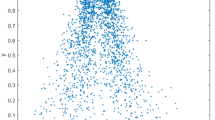Abstract
The design of DNA sequences is essential for the implementation of DNA computing, where the quantity and quality can directly affect the accuracy and efficiency of calculations. Many studies have focused on the design of good DNA sequences to make DNA computing more reliable. However, DNA sequence design needs to satisfy various constraints at the same time, which is an NP-hard problem. In this study, we specify appropriate constraints that should be satisfied in the design of DNA sequences and we propose evaluation formulae. We employ the Invasive Weed Optimization (IWO) algorithm and the niche crowding in the algorithm to solve the DNA sequence design problem. We also improve the spatial dispersal in the traditional IWO algorithm. Finally, we compared the sequences obtained with existing sequences based on the results obtained using a comprehensive fitness function, which demonstrated the efficiency of the proposed method.



Similar content being viewed by others
References
Adleman LM (1994) Molecular computation of solutions to combinatorial problems. Science 266(5187):1021–1024
Deaton R, Garzon M (1998) Thermodynamic constraints on DNA-based computing. In: Computing with bio-molecules: theory and experiments. Springer, Singapore, pp 138–152
Deaton R, Franceschetti DR, Garzon M, Rose JA, Murphy RC, Stevens Jr SE (1997) Information transfer through hybridization reaction in DNA based computing. In: Conference: in genetic programming 1997: proceedings of the second annual conference, July 13–16, 1997, Stanford University, Morgan Kaufman, San Francisco, 1997, pp 479–490
Hartemink AJ, Gifford DK, Khodor J (1999) Automated constraint based nucleotide sequence selection for DNA computation. Biosystems 52(1–3):227–235
Frutos AG, Thiel AJ, Condon AE, Smith LM, Corn RM (1997) DNA computing at surfaces: four base mismatch word design. In: Proceeding Of 3rd DIMACS workshop on DNA based computers, University of Pennsylvania, Baltimore, pp. 238–239
Arita M, Kobayashi S (2002) DNA sequence design using templates. New Gener Comput 20(3):263–277
Liu WB, Wang SD, Gao L, Zhang FY, Xu J (2003) DNA sequence design based on template strategy. J Chem Inf Comput Sci 43(6):2014–2018
Feldkamp U, Saghafi S, Banzhaf W, Rauhe H (2001) DNA sequence generator-A program for the construction of DNA sequences. In: The 7th international workshop on DNA-based computers: DNA computing, Springer, vol 2340. pp 23–32
Marathe A, Condon AE, Corn RM (2001) On combinatorial DNA word design. J Comput Biol 8(3):201–220
Tanaka F, Nakatsugawa M, Yamamoto M, Shiba T, Ohuchi A (2001) Developing support system for sequence design in DNA computing. Lect Notes Comput Sci 2340:129–137
Shin SY, Lee IH, Kim D, Zhang BT (2005) Multiobjective evolutionary optimization of DNA sequences for reliable DNA computing. IEEE Trans Evol Comput 9(2):143–158
Xu SM, Zhang Q (2008) Optimization of DNA coding based on GA/PSO algorithm. Comput Eng 34(1):218–220
Xu CX, Zhang Q, Wang B, Zhang R (2008) Research on the DNA sequence design based on GA/PSO algorithms. In: The 2nd International Conference on Bioinformatics & Biomedical Engineering (ICBBE), IEEE, Shanghai, China, pp 816–819
Zhang Q, Wang B, Wei XP, Fang XY, Zhou CJ (2010) DNA word set design based on minimum free energy. IEEE Trans Nanobiosci 9(4):273–277
Yin Z, Ye CM, Wen M (2011) Research on DNA encoding based on cultural particle swarm optimization algorithm. Comput Eng 37(3):10–12
Yin Z, Ye CM, Ma HM (2011) Cultural evolution based particle swarm optimization algorithm for DNA sequence design. Comput Eng Appl 47(1):40–42
Xiao JH, Jiang Y, He JJ, Cheng Z (2013) A dynamic membrane evolutionary algorithm for solving DNA sequences design with minimum free energy. Commun Math Comput Chem 70:987–1004
Zhang XC, Wang YF, Cui GZ, Niu Y, Xu J (2009) Application of a novel IWO to the design of encoding sequences for DNA computing. Comput Math Appl 57(11–12):2001–2008
Luo DF, Luo DJ (2013) The research of DNA coding sequences based on Invasive Weed Optimization. Sci Technol Eng 13:3545–3551
Mehrabian AR, Lucas C (2006) A novel numerical optimization algorithm inspired from weed colonization. Ecol Inform 1(4):355–366
Santalucia J (1998) A unified view of polymer, dumbbell, and oligonucleotide DNA nearest-neighbor thermodynamics. Proc Natl Acad Sci 95(4):1460–1465
Sun YT, Zhang Q, Wu D (2010) Based on the Cauchy distribution reproduce mode improved IWO algorithm research and application. In: The 2nd international conference on information science & engineering (ICISE), IEEE, Hangzhou, China, pp 1057–1060
De Jong KA (1975) An analysis of the behavior of a class of genetic adaptive systems. Ph.D. Thesis University of Michigan
Acknowledgments
The authors would like to acknowledge the reviewers’ constructive suggestions and comments.
Author information
Authors and Affiliations
Corresponding author
Rights and permissions
About this article
Cite this article
Yang, G., Wang, B., Zheng, X. et al. IWO Algorithm Based on Niche Crowding for DNA Sequence Design. Interdiscip Sci Comput Life Sci 9, 341–349 (2017). https://doi.org/10.1007/s12539-016-0160-0
Received:
Revised:
Accepted:
Published:
Issue Date:
DOI: https://doi.org/10.1007/s12539-016-0160-0




